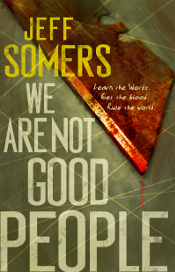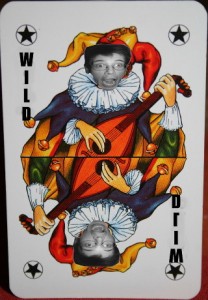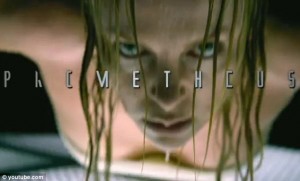
BUY ME
This story is … not so good. Written maybe 25 years ago or so, it’s notable only in that it’s an extremely early appearance of the magic system (and character of Hiram Bosch) that eventually turns up in We Are Not Good People. It’s almost unrecognizable – but it’s there. Cheers!
We were having coffee and cake and I was torturing Sally because she was so easy to upset. I enjoyed being mean to her. She clung to Harv and eyed me with big deer eyes, frightened by such cruelty. Harv was trying to be manly, so he laughed as if it was all funny. Maybe he even thought it was. I wasn’t being funny, though. I was being mean.
Billy slurped his coffee next to me and laughed in that soundless way he had, bobbing his head and grinning without a noise. Billy was a good, solid guy to have at your side, he was big and thick and had a presence. When Billy laughed you knew it, even if he didn’t make a noise. The whole room shook.
The place was pretty packed for one in the morning, mostly with kids like us, slackers from school or just out of it, smoking cigarettes and not wanting to get up for work or class tomorrow. I never wanted to go to work again, and I let my glittering eyes trail across them all with equal fear and loathing. I didn’t need any of them, and thank god for that. What do you get out of them, anyway? Fifteen minute friendships, and a year later you could pass them in the street gladly and not say a thing, if only you had the guts. No thanks.
I blew smoke towards Sally and grinned. She was trying so hard to like me, a friend of her new, true love, but I couldn’t let that be. If she was going to include me in her sunny, all-is-well-under-a-catholic-god world, it was going to be the hard way.
The cheesecake was good, but the coffee was bitter, probably been brewing for hours. I grimaced every time I sipped it, and had already put three too many packs of sugar into it. No one else seemed to mind. Bill was just drinking it because we were, and Harv sat with his arm around Sally like a dog pissing out territory. You could almost see his dick get hard every time he looked around the place and realized he was the one cock in the henhouse for this babe. Sally was like a little girl, scared and confused, and she grabbed at him sometimes like she was afraid of him, and that made him love her. I sat back and watched them as they talked with Billy, flicking ashes around the table and scratching at the beard I was going to have to shave off tomorrow. She was looking for a father and he was looking for someone pretty who he could take care of and feel smarter than, and the only thing that made me think they were really in love was the fact that in the year and a half they’d been together they hadn’t had sex, at her insistence.
Harv grinned at me like a man in love and I laughed at him.
Me and Billy, we were confirmed bachelors, wasted and probably unwanted. I had no illusions. I was no catch. I hated everyone I met and brooded alone too often, I dressed badly and drank too much, I was no fun at parties and said the meanest things, sometimes. The few women friends I had managed not to offend seemed to think this meant I’d be married soon enough, but deep down I knew I’d prove them wrong.
On those days when Harv and Sally were off being a couple, me and Bill would haunt the town on our own, raising what little hell we could manage on our own and feeling glad to be lonely. At least, I was glad to be lonely. I didn’t know how Billy felt about it. I was having fun, though, not having to be nice to anyone.
They started to talk about high school and all the old buddies they hadn’t seen in years, and I got bored instantly. If there had been anyone I’d actually liked in high school, I’d stayed in touch with them. The rest were gone and happily so, as far as I was concerned. I didn’t even like to think about most of them, these days.
I looked around at all the kids around us, chattering away, probably discussing their own wild, crazy pasts way back when they’d been sixteen and freewheeling. For most of them, hangovers and puke stories were the closest they ever got to excitement. Maybe a few sex tales, the forbidden and the mildly disgusting. For the rest of their lives, they’d be talking about the same crap, over and over again, to new sets of friends every couple of years. I wasn’t much different, I guess, in the long run. Just because I saw my stupid stories for what they were didn’t make them any more important.
I went from face to face and stared a little. Some of the girls were cute, and I smiled whenever they caught me staring. A few smiled back, not knowing what they’d be getting into, and I just shook my head and looked away, smiling. Billy and Harv were trading puke stories, right next to me, and I sipped cooling coffee with an odd mix of jealousy and dismay. I hated when people get like that, so small and dim, and then again sometimes I wished I could get down there, too.
Something caught my ruddy eyes and I glanced up at an old man sitting at the counter, making a Danish float over to him while the waitress looked the other way, filling coffee.
He did it with such matured ease and guilty knowledge, I knew I hadn’t gone nuts. I watched him for a few minutes more but he didn’t do anything strange after that, and then Billy was poking me and saying something about old times. I turned back to my companions and dragged the last of my cigarette, snuffing it in the ashtray as I exhaled and looked around.
“I don’t believe in old times.”
They looked at me strangely, but that was all right since it was time to get going. We all tossed money onto the table and stood up. It didn’t add up right so I kicked in an extra three to even it up. Sally hugged Harv on impulse and smiled at me; I scowled back and brushed past them harshly.
Walking home from Pirelli’s, me and Billy talked about things.
He walked too fast for me, and I smoked too much these days to keep up with him. I was always worrying about heart attacks, now. That was how I knew I was getting old. Billy, he sees the humor in everything. Everything is funny to him, even his own tragedy. Because of that he can walk into a room and be friends with everyone in moments, with just a few jokes and a roll of quiet laughter. Just like I hate everyone, Billy loves them all. And just like I don’t really hate everyone, I suspect Billy doesn’t love them all, either. Sometimes I think he might hate them all more than I do.
We talked about how easy our lives were. I was saying that I wished some catastrophe would happen to elevate me to the higher calling of hero, and Billy seemed to think that that was selfish as all hell. I guess it was, but hell, I had a point, I think. When the bomb drops we won’t have to work for a living; just surviving will be a noble calling. You’ll be able to kill in good conscience and no one would be able to waste away in front of the TV anymore. Of course, to Billy, that was the worst things he’d ever heard. Billy liked TV.
Our upstairs neighbors were sitting on the porch when we got home. Gwen and Judy. They were smoking light cigarettes like the girls they were and they began flirting with us almost immediately. I’ve lived in three apartments, and this was the first one we’d actually met our neighbors in. Usually they were faceless and annoying, the creeps who played disco at four in the morning, the morons who threw parties and didn’t invite us. This time they were sweet and me and Billy lusted after them in our spare time, dirty little fantasies involving the usual shit, the same boring sex over and over again. It passed the time. In real life we had delightfully meaningless conversations whenever we ran into each other. I had the feeling we might have been friends, if we hadn’t lived in the same building.
“Out late, boys.” Gwen said, blinking her brown eyes. I swooned. Billy said something funny and they laughed. I grinned despite not hearing.
We sat down with them for a little bit, but we were never going to screw them, so I got bored quick and made my excuses, drifting into the pad feeling tired and dull. In four hours I had to wake up and go to work and my supply of smart-assed bullshit had reached a giant low. A few more minutes out on the porch and I’d have strangled someone. I was safer inside.
Every weekday was like this:
I woke up at eight o’clock just to hit the snooze on my clock, a weird fifteen minutes of half-sleep that I went through twice just for fun. I had put my clock across the room on top of the stereo so I’d have to get up to hit the snooze, it was amazing how I could sleep through the wail of my alarm if I let myself. I crawled out of bed at eight-thirty and went to the bathroom to brush my teeth and take a piss, staring at myself in the mirror like a dead man. If I needed it, I shaved.
At quarter to I was out the door and into the street, trying to remember where I’d parked the car. I turned on the radio and pulled off and by nine o’clock I was still about five minutes away, I don’t think I’d been strictly on time in months. All day I drank coffee and pushed papers around and at five o’clock I left, speeding home as if my life depended on it. I spent the night trying to forget that I had to get up the next day. I’d go out with Billy and drink socially, or I’d call some other friend, one of the few that hadn’t drifted away in the wake of my accumulating bitterness, and we’d go out and drink socially. If it was one of my girl friends I’d try to get her drunk, which I guess is a low and dirty thing to do. Or maybe me and Billy would rent movies and gripe about our lost youth. Sometimes we even had things to do, places to go.
We were having drinks with Maureen and her best friend Amy after work, Billy and I. I’d had a few too many for a Wednesday night and Maureen did not like drunks. She was arch and disapproving and after the third whiskey in soda I was drinking just to spite her. Billy knew what was going on and chortled quietly along with Amy, who liked Bill well enough even if he didn’t know it. I loved ruining Maureen. Gleefully, I started playing up the drunk, speaking too loud and making grand gestures. Then I got bored, and as Amy started talking about some creepy guy sending her obscene faxes at work, I started letting my mind wander.
Harv and Sal were at the bar having a bad time, arguing about the same shit everyone always argued about, except it was special for them, unique. Some people just didn’t open their eyes, they just looked at what they wanted to look at. To Harv and Sal, everything that happened to them was the first time it had ever happened, to anybody.
I brought up magic, lighting a cigarette and leaning back with smoke around me like an aura, asking them if they believed in it or not. Maureen and Amy, of course, did not, they didn’t even understand the question. That was okay, I was used to being the only one, I was always the only one. Half the time no one understood me and when they understood me they usually didn’t like what I was saying. Billy said he believed in magic, but Billy was apt to believe in anything, if you caught him at the right time. Billy smiled and said something about Leprechauns.
I told them that I believed in magic because if sitting in bars with dumb friends was all life had to offer by way of entertainment, then I might as well stab myself and be done with it. They failed to find the humor there, and Maureen got all worked up about me being an asshole. A minute before I’d been a smart choice to have drinks with, suddenly I was everyone’s asshole. Except Billy, Billy was fully of love for everyone, he smiled at the world and held no grudges.
I decided right then that the smart thing to do would be to just hang out with Billy exclusively, for the rest of my life. I sneered at Maureen and said so. Next to me, Billy grinned like a sudden millionaire. Maureen looked like she’s suddenly remembered better things she could be doing.
I got a little tired of being the asshole and apologized. It was too late. Maureen decided to leave and since room-mates cannot survive for long without their partner, Amy shrugged sadly at us and got up too. I toasted Billy and he laughed, and for a few quiet moments we just sat there with our heads resting in our hands, watching the cute girls and talking about them as if we knew them.
Harv dragged a beer over to us and sat down with a scowl that just sent me and Billy into hysterics. Sally trailed behind him like a kicked dog, obviously distressed that she couldn’t whine and wheedle in front of us without stirring up our bad sense of humor. If she’d been a little more complicated, she would have been pissed off that he’d sat down with us because of that, to shut her up.
I walked home alone, because Billy ran into some friends I didn’t know and decided to skip work and get drunk. I was already drunk, so I stepped out into the cold with my hands in my pockets. The streets were empty, it was too cold to loiter and the cops kept the bums moving so they wouldn’t freeze to death in our town. Every now and then one still managed to croak, and it was very embarrassing.
He was standing on the corner across from me, and I stopped to stare at him, my loosened mouth just sort of hanging. If anything the frozen moonlight made him look older, more decrepit. He was standing with his arms out, crucifixion style, and pigeons were landing on him. Grey and white, plump and seemingly unaffected by the cold, they pecked the ground at his feet and perched on his arms, lined up from wrist to wrist, cooing. We stared at each other for a while, and then I crossed the street, keeping my eyes on him in case he might disappear.
When I was a few feet away, standing in the gutter, I stopped. I was shivering.
“How do you do that?”
He flicked an eyebrow, and a bird fluttered easily to my shoulder, settling in comfortably and grooming itself.
“It’s easy,” he said, his voice dry and brittle like the air. “You just have to not mind being alone.”
We stared again, and the birds suddenly leapt into the air, a fluttering commotion of wings. I threw my arms up reflexively and when I opened my eyes, he was gone.
No one was sitting outside when I got home, which was good, since I didn’t have any snappy dialogue or frustrated lust to keep me interested in dull neighbors. The apartment was dark and empty, filled with unwashed dishes and garbage, dirty clothes and newspapers. I went to my room and stood in the dark, looking around at the books and albums, the posters and crumpled sheets. I didn’t recognize anything. It was all foreign to me. I wondered what I’d been saving for. I sat down at the desk and stared blindly at papers and parking tickets. I realized that for the first time in three days, I was by myself. It felt strange, after all that time.
My eyes caught the group of small shells an old friend I never talked to anymore had collected off of a beach and given me. They had been growing a thick pelt of dust for two years, but at one time they’d been special and so I never could throw them away. For the first time in months, I concentrated on them.
In the silence and quiet, the lonely darkness, I could feel their presence, their solidness and mass. I could feel the forces working on them, gravity and pressure. It was all so easy. They jiggled a little, and rose into the air, sustained against gravity by my will alone. I stared and then let them drift back into place, feeling nature take over where I released them. Then I leaned in and dug through my desk, looking for cigarettes.
We were in the diner again, the usual four of us again. Billy and Harv, the bastards, had abandoned us and left me stirring coffee listlessly with Sally for company. They were probably in the bathroom smoking and making fun of me.
She looked at me strangely, biting her lip. “Are you really leaving?”
I nodded. “Yeah. In two weeks, when the lease is up.”
“Why?”
Something vague and inexplicable, but powerful and changing, was beyond her. But I had run out of bitterness, and so I just sighed.
“Sometimes, you have to change things.”
“Everything? All at once?”
“No other way.”
It was the longest civil conversation we had ever had. She looked sad, and I wondered if it were possible that she might even miss me. I guess it was possible she didn’t know how mean I’d been to her.
Billy and Harv came back with a cake, slapping me on the back and grinning. I guess no one knew how mean I’d been to them all. Dumb fucks, I don’t see how they couldn’t. I don’t see how they couldn’t hate me, after all this time. It wouldn’t bother me if they did, it just amazed me that they didn’t.
I smiled and posed for pictures, I even hugged Sally and made her feel good about it. I could do this and not hate them, because I was leaving forever.









